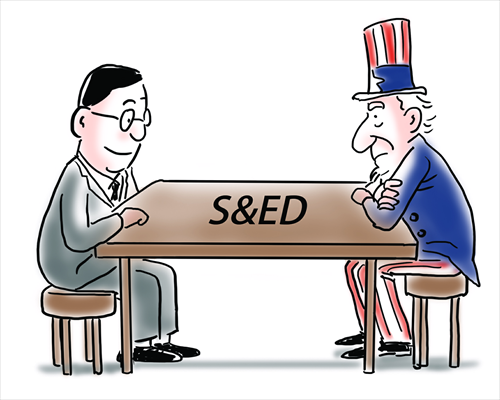S&ED crucial, but not enough in twilight of Obama era

Illustration: Liu Rui/GT
Don't expect any major breakthroughs from the eighth China-US Strategic and Economic Dialogue (S&ED) on Monday and Tuesday in Beijing. And that is the problem.
The S&ED is an annual ritual designed to manage the complex Sino-US relationship. It occurs at a moment of growing volatility in regard to both the economic and the strategic tracks.
Given the complexity and interdependence of Sino-US relations, the S&ED may be necessary, but it is not sufficient to keep the bilateral relationship on a trajectory that is more cooperative and competitive. It is getting ever more difficult to manage differences, even more so as US President Barack Obama becomes a lame duck in the twilight of his presidency.
US officials argue that the policy discussion among nearly 20 agencies from each side is a mechanism to "put a floor under the relationship," as Assistant Secretary of State Daniel Russel explained recently. Perhaps. But the floor has some gaping holes in it.
The annual stock-taking of the relationship may be helpful for cooperation on softer issues like climate change, clean energy, wildlife protection, even peacekeeping. But at a time when the political consensus underpinning US policy toward China is eroding amid anti-China presidential campaign rhetoric, demonstrable progress is urgently needed on key issues that shape the relationship.
In the economic sphere, friction over currency policies has been overtaken by trade and investment issues. The US has hit China with a long list of anti-dumping tariffs in steel, aluminum and other industries, charging that Beijing's subsidies to State industries is causing over-supply. This concern goes to an issue that China raised during the S&ED: attaining market economy status for China when the current WTO provision expires in December. But many in the US and EU cite Chinese subsidies to troubled industries as cause for not granting Beijing market status until it moves forward with Chinese President Xi Jinping's market reforms. This will require difficult negotiations to sort out.
In addition, many US technology firms complain of unfair barriers limiting their market access, to the benefit of competing Chinese firms.
Another key issue is the implementation of recent commitments to enhance cybersecurity cooperation and prevent commercial cybertheft. There has been progress, but how effective it is remains an open question.
The US business community has been the foundation of support for Sino-US relations, but recent developments have eroded their enthusiasm about the bilateral relationship.
Perhaps the most important economic issue is the slow pace of progress on the Bilateral Investment Treaty (BIT). The BIT is essential to deepening Sino-US economic ties and allowing reciprocal investment. But the so-called "negative list," or areas to be excluded, offered by China has been viewed as too large by the US.
On the strategic track, North Korea and tensions in the South China Sea top the list of priorities. US officials praise China's support for UN Security Council resolution 2270 imposing tough sanctions on North Korea. But there are questions in the US about how fully China is implementing them.
Tensions over Chinese and US activities in disputed reefs and islands in the South China Sea have been rising to potentially dangerous levels as China has built new facilities on territory it controls and the US has responded by sending planes and ships over the territories to emphasize its commitment to freedom of navigation.
There has been little sign of progress on this issue, which appears a proxy for contentious views on the respective US and Chinese roles in the Asia-Pacific region. Increasing military actions raise the risk of incidental clashes that could escalate. This large stew of contentious issues in the Sino-US relationship suggests that something more than the bureaucratic laundry list of the S&ED is needed to manage the relationship.
While the S&ED may be useful to the many complex parts of the overall relationship, there is a need to prioritize three or four key issues on which progress must be demonstrated. Issues such as the BIT, market access, the South China Sea, North Korea, and perhaps strategic cooperation in the Greater Middle East, are issues where continuous high-level efforts are needed to move Sino-US ties into a more cooperative mode.
This is a particularly difficult moment, as the period between now and the next US administration in 2017 may be one where the US is in political limbo. China is unlikely to find a more cooperative US president than Obama. This would be a good time to lock in progress.
The author is a Senior Fellow of the Brent Scowcroft Center for International Security at the Atlantic Council. Follow him on Twitter @RManning4.